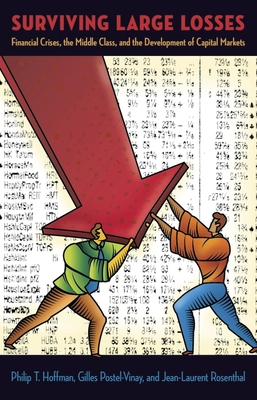

 Belknap Press
Belknap Press
Surviving Large Losses: Financial Crises, the Middle Class, and the Development of Capital Markets


Key Metrics
- Philip T Hoffman
- Belknap Press
- Paperback
- 9780674036369
- 7.8 X 5 X 0.8 inches
- 0.65 pounds
- Business & Economics > Finance - General
- English
 Secure Transaction
Secure TransactionBook Description
Listen to a short interview with Philip T. HoffmanHost: Chris Gondek - Producer: Heron & Crane
Financial disasters often have long-range institutional consequences. When financial institutions--banks, insurance companies, brokerage firms, stock exchanges--collapse, new ones take their place, and these changes shape markets for decades or even generations. Surviving Large Losses explains why such financial crises occur, why their effects last so long, and what political and economic conditions can help countries both rich and poor survive--and even prosper--in the aftermath.Looking at past and more recent financial disasters through the lens of political economy, the authors identify three factors critical to the development of financial institutions: the level of government debt, the size of the middle class, and the quality of information that is available to participants in financial transactions. They seek to find out when these factors promote financial development and mitigate the effects of financial crises and when they exacerbate them.Although there is no panacea for crises--no one set of institutions that will resolve them--it is possible, the authors argue, to strengthen existing financial institutions, to encourage economic growth, and to limit the harm that future catastrophes can do.
Author Bio
Philip Hoffman is interested in combining economic theory and historical evidence to explain long-term changes in politics, society, and the economy—in particular, economic growth and political development. His current research focuses on several areas. He's exploring why the West grew rich before other parts of the world and why it became a dominant military power.
Another area of interest is the evolution of financial institutions and their effect on economic growth. Specifically, he's trying to understand how mortgage markets developed in France and how they were affected by institutional change. Finally, Hoffman is interested in how states develop the capacity to levy taxes and provide public goods.
Hoffman was president of the Economic History Association in 2013–2014 and co-editor of the Journal of Economic History from 2006 to 2010, and he will become the incoming president of the Social Science History Association in 2019. He has been a visiting professor at the Ecole des Hautes Etudes en Sciences Sociales in France, a visiting researcher at the Paris School of Economics (2011), and a visiting professor at the Hong Kong University of Science and Technology (2013).
In addition to numerous articles, he has written six books and edited two.
He has won the Gyorgy Ranki Biennial Prize from the Economic History Association twice, for Priceless Markets: The Political Economy of Credit in Paris, 1660–1870 (2001) and for Growth in a Traditional Society: The French Countryside, 1450–1815 (1997), which was also awarded the Allan Sharlin Memorial Award from the Social Science History Association. In addition to receiving other prizes for his books and articles, he was a John Simon Guggenheim Fellow in 2001.
- Education
- A.B., Harvard College, 1969;
- M.A., University of California, 1971;
- Ph.D., Yale University, 1979.
- Lecturer in History, Caltech, 1980-81; Instructor, 1981-82; Assistant Professor, 1982-84;
- Associate Professor of History and Social Science, 1984-95;
- Professor, 1995-2003;
- Richard and Barbara Rosenberg Professor of History and Social Science, 2003-08;
- Axline Professor, 2008-. Executive Officer for the Humanities, 1995-2000.
- Research Interests
- Economic History of Europe and the World; Economic Development; Institutional Change
Source: California Institute of Technology Division of The Humanities and Social Sciences
Videos
No Videos
Community reviews
Write a ReviewNo Community reviews